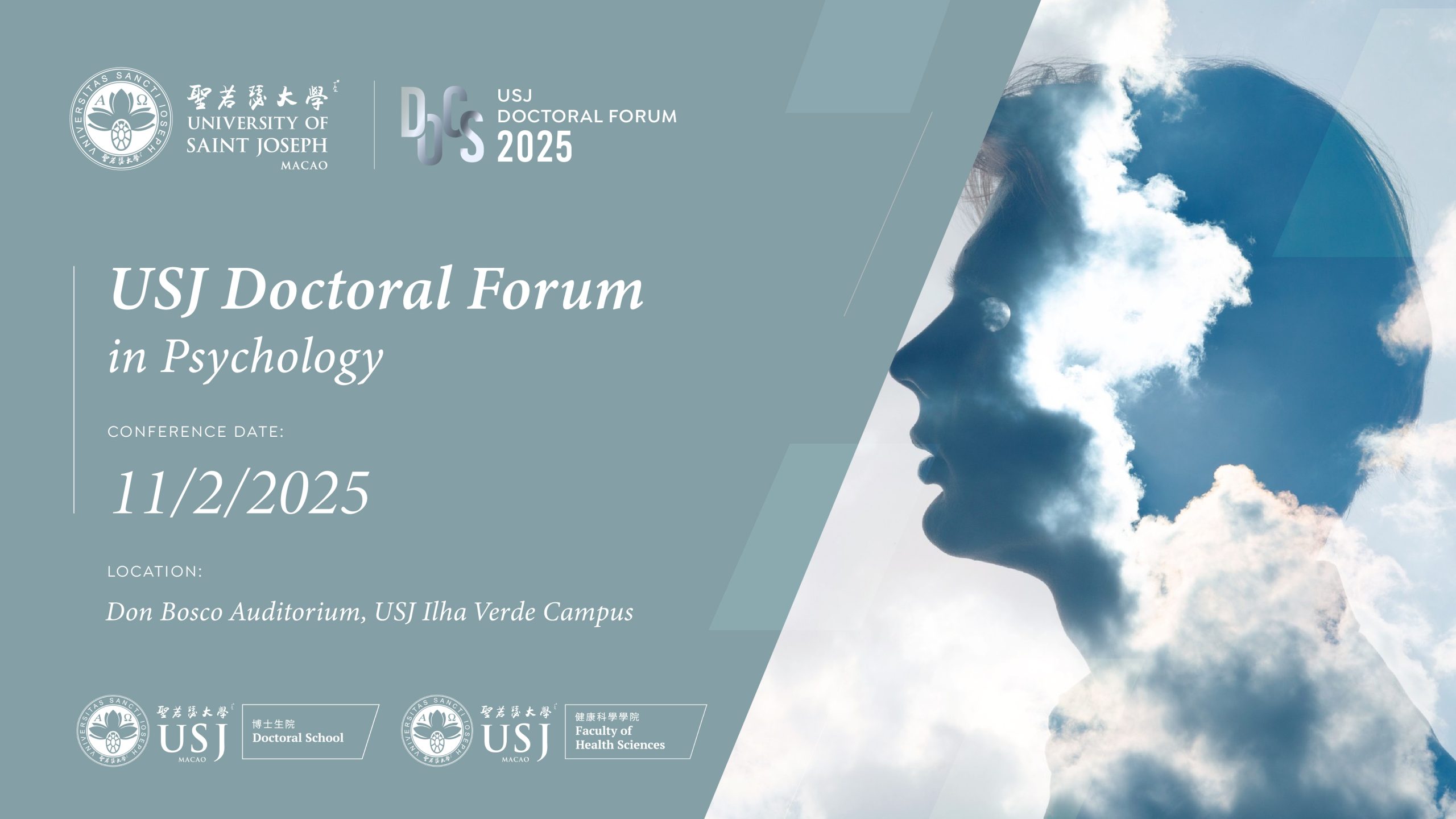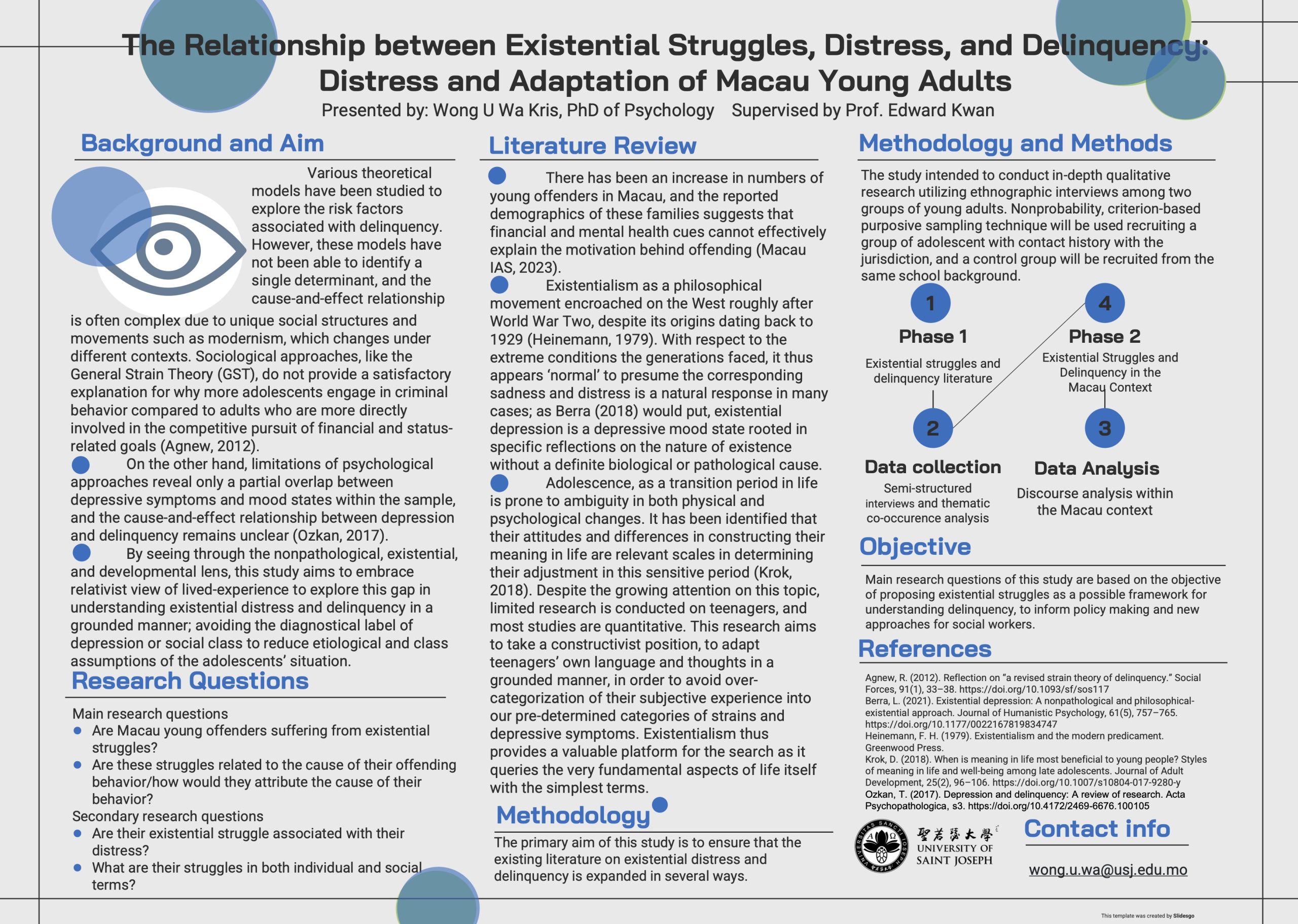USJ Doctoral Forum in Psychology 2025

USJ Doctoral Forum in Psychology 2025
11
Feb
The USJ Doctoral School, and the Faculty of Health Sciences are organising a Doctoral Forum in the study/research area of Psychology on the 11th of February, 2025, in the Don Bosco Auditorium of the Ilha Verde Campus.
Programme:
Date: Tuesday, 11 February 2025
Time: 6:30 PM – 10:00 PM
Location: Don Bosco Auditorium, USJ Ilha Verde Campus
Organised by: Doctoral School and Faculty of Health Sciences
*Free event, open to the general public
18:30 – 19:00 | Opening Session
- Rector of USJ, Rev’d Prof,. Stephen Morgan
- Dean of the Doctoral School, Prof. Adérito Fernandes-Marcos
- Dean of the Faculty of Health Sciences, Prof. Jacky Ho
- Prof. Angus Kuok, Area Professor for Psychology
19:00 – 19:30 | Presentation of the USJ Research Lines in Psychology
- Prof. Vitor Teixeira, Department of Psychology / Faculty of Health Sciences
19:30 – 20:30 | Keynote Presentation: “From the lab to the jungle: The psychological study of spiritual beliefs and practices across cultures”
About the Talk:
The replication crisis in psychological science is now a decade old. Here I will give examples of how my work on the psychology of spiritual beliefs and practices, and its applications to mental health, has extended itself culturally and methodologically to respond to the various biases in psychological research. I will give examples of the use of various methods, from fMRI to field studies; finally, I will report an ongoing research engagement with indigenous worldviews from the Amazon, which presents various challenges to conventional psychological wisdom.
About the Speaker:
Miguel Farias is an Associate Professor and the founding director of the Brain, Belief, & Behaviour lab at Coventry University, a Lecturer at Oxford University’s Department of Continuing Education, and the Director of Psychological Studies at SCIO, Wycliffe Hall, Oxford University. He is a leading expert on the science of meditation, and in the interaction between cognitive-behavioural and biological dimensions of spiritual practices and experiences, with more than 4800 academic citations.
He studied psychology and cognitive-behaviour therapy at the University of Lisbon, followed by a doctorate in experimental psychology at Oxford University (2000-2004), and an MA in the study of religion/religious experience at the University of Wales, Lampeter (2005). He was a postdoctoral researcher at Cambridge University and Oxford University (2005-2007) and a Lecturer in Experimental Psychology at Oxford University (2008-2013).
He has been principal investigator or co-principal investigator in 16 research grants and his work has been reported across international newspapers and magazines, radio, and TV documentaries. He has written for New Scientist, Spectator, Telegraph, and the BBC. His book The Buddha Pill: Can Meditation Change You?, with Catherine Wikholm, has been translated into various languages. In 2017 he won the William Bier Award, given by the American Psychological Association, Division 36, for his contributions to the psychological study of spirituality. His latest book is the Oxford Handbook of Meditation.
20:30 – 21:00 | Light Dinner
21:00 – 21:30 | Presentation of Doctoral Projects
“The Relationship between Existential Struggles, Distress, and Deviant Behavior: A Qualitative Study of Emotion and Adaptation of Macau Young Adults”
Speaker: U Wa Wong Kris
Abstract: The emotional struggles of young adults aged between 18-29 during emerging adulthood, including risk-taking and depression, pose significant global concerns. While adolescent risk behaviour studies address predictors and prevention, emerging adults’ unique challenges require further investigation due to varying cultures and geographical contexts. Research on youth deviance in Macau is limited despite rising issues such as juvenile delinquency and violence, with a significantly large proportion originating from families above the poverty line, challenging the assumed link between economic hardship and deviant behaviour. This indicates a complex interplay of factors influencing youth deviance in Macau.
Transitioning from adolescence to emerging adulthood includes uncertain physical and psychological changes, where attitudes and interpretations of life’s meaning significantly impact adaptation. This phase involves an in-depth exploration of life, marked by anxiety and a search for purpose, potentially leading to existential issues. A decline in well-being without a clear biological cause may indicate a life crisis, resulting in feelings of helplessness. Recently, there has been a growing interdisciplinary interest in investigating how modernity, spurred by science and technology, drives individuals to seek life’s meaning, echoing Nietzsche’s concept of the ‘Death of God’ as traditional values wane. This societal shift compels individuals to establish their own significance, often leading to anxiety and existential distress or depression. Psychological research has linked modern beliefs and environments to depression, suggesting that contemporary living conditions may contribute to distress or even major depressive disorders. Despite growing awareness, research focusing on young adults remains limited and predominantly quantitative, underscoring the necessity for phenomenological studies that honour young adults’ subjective experiences. Existentialism provides a crucial framework for exploring these fundamental life questions.
This qualitative study aims to examine how adolescent experiences shape young adults’ lives through a non-pathological and social determinism lens, combined with an existential perspective that highlights the ambiguous blend of mental and external states with ground theory.
Keywords: Young adults, deviant behavior, distress, existentialism, qualitative research
21h30 | Closing Remarks
22h00 | End











